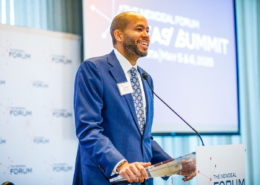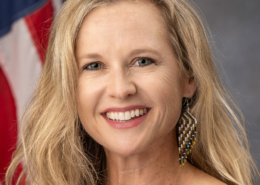By Debbie Cox Bultan
CLICK FOR FULL ARTICLE
At this moment of chaos at the federal level, state and local leaders continue to step up to the plate to develop and implement bold, effective policy ideas. Whether it’s programs utilizing historic investments to boost economic development, supporting our democratic institutions or making it easier for people to obtain a high-quality education, these leaders have been playing an indispensable role in solving meaningful challenges facing people in America.
So with that in mind, here are four innovative ideas worth stealing and implementing across the country. (These are drawn from many more shared as part of NewDEAL’s biennial Ideas Challenge.)
First, in Oregon, there’s work underway to leverage historic federal investments to empower and diversify the local semiconductor workforce. According to the state, “semiconductor manufacturing is Oregon’s largest manufacturing sector in employment, exports and contribution to state GDP.” That’s why the work of Rep. Janelle Bynum, D-Ore., is so critical. She authored Oregon’s bipartisan CHIPS Act, which leverages $3.2 million in federal investments in the semiconductor industry to fuel equitable economic development and strengthen Oregon’s status as a global leader in semiconductor manufacturing.
So far, the grants have gone to support two Portland, Oregon, nonprofits — Self Enhancement, Inc. and Building Blocks 2 Success — which help connect young people with new job opportunities by focusing on education and training. Grant programs like these can be replicated in other areas to boost the STEM workforce and make sure that young people have the skills needed to access the good-paying jobs of the future.
Meanwhile, in Georgia, elected officials are working to uplift people in historically marginalized communities by creating sustained pathways for economic opportunity. ZIP codes should not be the primary indicator of future opportunities. That’s why Rep. Phil Olaleye, D-Ga., has sponsored legislation that invests in students living in poverty and schools in underserved communities. By creating a mechanism to distribute state resources to under-resourced schools that serve disadvantaged areas, the Georgia Educational Opportunity Act addresses diverse educational needs, from rural transportation to mental health support and urban meal programs, helping to eliminate disparities. This measure helps level the playing field and lays the foundation for educational opportunity, a crucial building block for a strong economy.
In Richmond, Virginia, Mayor Levar Stoney developed an initiative to lower costs of education and create economic opportunities for families.
Upfront costs are often a barrier to entry to higher education. To create additional pathways to college and skills training for Richmond public school students, Stoney pioneered the Richmond Pathways Program. The program, now in a pilot phase, covers the costs associated with Reynolds Community College attendance and provides students with resources like mentorship to help them meet their educational and professional goals. Investments like this will lead to higher rates of college completion, a larger concentration of highly skilled workers and a stronger state economy.
Finally, New Mexico Secretary of State Maggie Toulouse Oliver is working to expand voting access to ensure free, fair and safe elections. As we head into this crucial election year, defending our democracy could not be more critical.
Toulouse Oliver championed the historic New Mexico Voting Rights Act and Election Infrastructure Bill, first-of-its-kind legislation that expands ballot access and strengthens election integrity.
Provisions with the state Voting Rights Act include the restoration of voting rights for formerly incarcerated individuals and a measure that ensures New Mexico’s Native American, tribal, and pueblo communities have accessible, safe and secure access to polling locations. Meanwhile, the Election Infrastructure Bill creates a streamlined election auditing system and provides more layers of protection to ensure the integrity of absentee ballots.
As we head into more political headwinds in Washington, these policy ideas stand as a testament to what’s possible when state and local leaders solve real problems facing our nation and put our communities first.
Debbie Cox Bultan is the CEO of NewDEAL, a national network of state and local elected Democratic leaders. The NewDEAL hosts a biennial Ideas Challenge policy competition highlighting effective policy solutions from NewDEAL Leaders across the country. From more than 80 initiatives and 20 finalists, four winners, described above, were chosen by a panel of experts for championing policies that protect democracy, lower costs, increase economic opportunity, promote equity and make the most of major federal resources allocated during President Biden’s first term. Cox Bultan can be reached on Linkedin.







